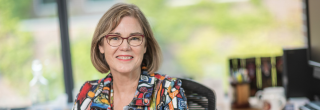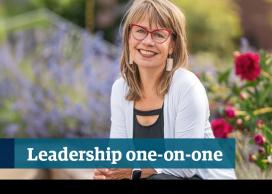Professor Lesley Cormack is Deputy Vice-Chancellor and Principal of UBC’s Okanagan campus. She joined UBC in July 2020 from the University of Alberta where she served as Dean of the Faculty of Arts from 2010 to 2020. Her achievements as Dean included increasing Indigenous student enrolment by 100% and hiring 14 new Indigenous faculty members; enhancing support for research, particularly interdisciplinary research; and supporting experiential learning.
A historian of early modern science, Professor Cormack specializes in geography and mathematics of 16th century England. She has a passion for theatre and served as a director for the Citadel Theatre in Edmonton for nine years. Her volunteer service also includes chairing the University of Alberta's United Way campaign, serving as president of the Canadian Society for the History and Philosophy of Science, and working with the International Union for the History and Philosophy of Science.
Q1. What quality do you most admire in a leader?
LC: I admire leaders who have the courage to do what’s right. This doesn’t always mean having the courage to go into battle, it can be the courage to be vulnerable and to let others take the lead. I also value someone who demonstrates honesty and integrity in their actions. A leader may not always tell people what they want to hear, but it is important to listen and always explain the ‘why’.
Q2. What makes you laugh?
LC: I laugh easily, and I find the absurd in things – maybe it’s my British heritage? I always feel that you should take the work seriously but you shouldn’t take yourself seriously. I hope to be able to laugh with people every day – that’s how you get the work done.
Q3. Who inspires you, and why?
LC: I have to say both my maternal and paternal grandmothers. One of my grandmothers was born in Manchester and came to Canada aged 10. She was one of the first women to attend the University of Alberta and wrote several novels during her lifetime. But what really inspires me is the fact that she married a farmer, and had to learn how to run a farm – so she rolled up her sleeves and did it! During the 1930s she wrote her novels at her kitchen table while still running the farm.
My other grandmother came from London. She married a cockney and they both emigrated to Prince George in 1924. Can you imagine how it must have been to leave a bustling city for a small community in another country? But her attitude was to ‘put one foot in front of the other’ and keep going.
When I look at both of their stories I am struck by their incredible attitude to ‘get on with it’. That’s what still inspires me to this day.
Q4. For you, what makes UBC different?
LC: The deep commitment to social justice, including the commitment to reconciliation with Indigenous peoples. This is especially present at UBC Okanagan which is what attracted me to the role here. We have access programs for Indigenous students which I consider to be the ‘gold standard’ for Canada.
Q5. What is the most important lesson you’ve learned, in your career to date?
LC: You can get a lot done if you don’t care who gets the credit. As a leader, I believe that part of the role is to empower and amplify others.
Q6. How do you like to recharge?
LC: I’m afraid that COVID-19 has hampered some of my favourite past-times. I love to travel, as well as going to the theatre and seeing friends. During COVID-19 I’ve been spending more time reading. I enjoy mystery novels, and have just finished a book by Louise Penny. I also like doing jigsaws and playing board games.
Q7. What is the best advice you were ever given?
LC: You should take actions because they are the right thing to do – not because you want glory or attention.
Q8. What do you value in your colleagues?
LC: A sense of humour and a team approach. I value when people bring their best selves to the table, when they give and take advice together. I also value those who don’t get caught up in the job description – success is about everyone pulling together. I like to think of the story of President John F. Kennedy’s visit to the NASA Space Center in 1962. He noticed a custodian carrying a broom. He interrupted his tour, walked over to the man and said, "Hi, I'm Jack Kennedy. What are you doing?” The custodian responded: "Well, Mr. President, I'm helping put a man on the moon."
Q9. What do you hope will be your lasting impact at UBC?
LC: In recent years UBC Okanagan has grown and evolved into such an incredible campus. We now attract $32M a year in research funding and students are eager to join our programs. I hope that during my time at UBC Okanagan, I can support our campus in its continued evolution as a full partner to the Vancouver campus and as an important contributor to the educational, social and economic success of British Columbia and beyond. I believe there’s so much that we bring to the table – for the benefit of UBC as a whole.
Q10. If you could have a super power, what would it be?
LC: As a historian, it would have to be time travel! I would love to meet famous people from the past and maybe even travel to the future to see what is going to happen.
Q11. Why is it important for UBC to have a campus in the Okanagan?
LC: I believe that bringing the weight of a great globally-recognized university to the interior of British Columbia contributes to the success of our region. It allows us to develop amazing partnerships with a range of communities, including Indigenous communities, businesses and policy makers. Having a campus in the Okanagan has allowed UBC to develop its own dynamic presence while working in partnership with UBC Vancouver to deliver complementary programs and research activity. The potential is huge and I’m excited to see how we develop in the future.
Q12. Last year UBC Okanagan outlined its vision for future years as part of Outlook 2040. What is your personal vision for UBCO?
LC: I joined UBC Okanagan at such an exciting time. Through Outlook 2040 we have articulated our ambitions for the future, including how we plan to meet the needs of our students as technology and demographics evolve. My own vision centres on how we harness our strengths, to build an infrastructure to help achieve those broader goals. I feel privileged to be principal of a campus that has the potential to be a leader in sustainability, reconciliation, diversity and equality, while flourishing in a growing community.
Published: January 11, 2021
Interviewed by: Kate Hunter, UBC Internal Communications



